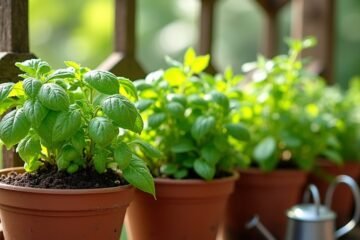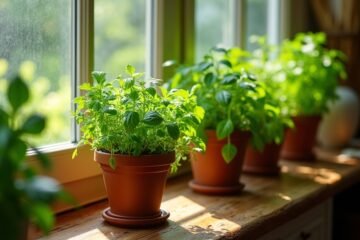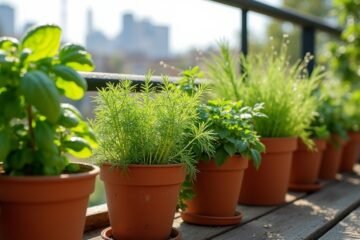Want your herb containers to thrive without pesky pests crashing the party? Try natural predators like ladybugs and lacewings—these tiny warriors feast on aphids, keeping your herbs safe! Or whip up a homemade garlic spray that smells stronger than a skunk at a dance party! Sprinkle diatomaceous earth for a dust that dehydrates those little invaders. Pair marigolds with your herbs for a garden duo that’s both charming and pest-repelling. Stick around, and you’ll uncover even more vibrant solutions!
Natural Predators for Pest Control
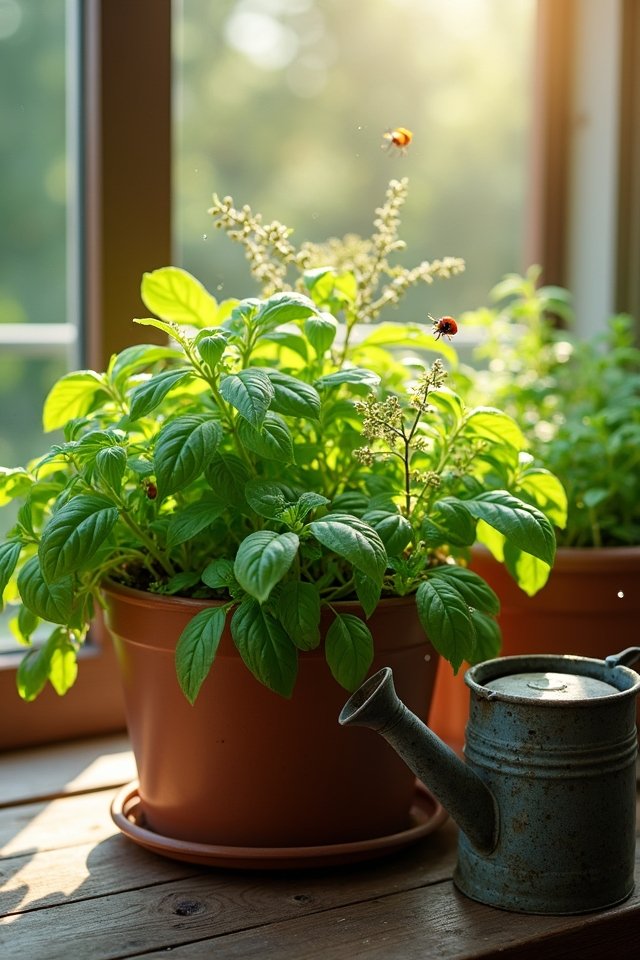
When it comes to keeping your herb containers thriving, inviting natural predators to your garden can be a game-changer! Envision this: a troop of ladybugs swooping in, gobbling up those pesky aphids like they’re candy! These beneficial insects make pest management feel effortless while adding a touch of magic to your garden. You can also try lacewings, the knights in shining armor of the insect world, as they feast on small pests, protecting your herbs from harm. Simply plant flowers like marigolds to attract these allies, or purchase them online. Imagine your herbs flourishing, free from munching intruders, with nature’s own pest control crew working overtime. Doesn’t that sound like the perfect eco-friendly solution?
Homemade Organic Sprays
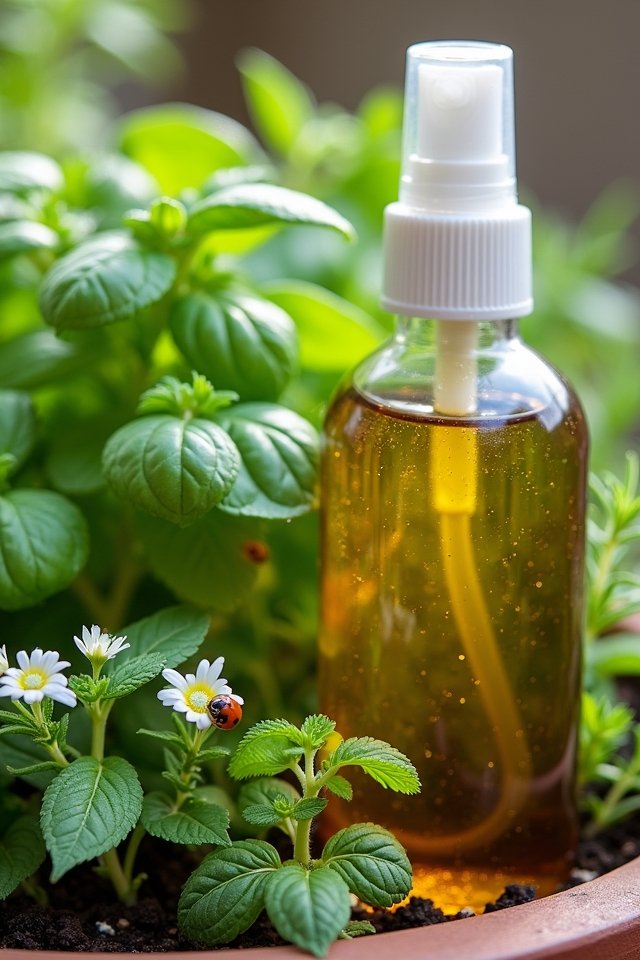
With your allies like ladybugs and lacewings patrolling your herb containers, it’s time to whip up some homemade organic sprays to kick pests to the curb! Think of these sprays as a superhero cape for your herbs. For a simple homemade insecticide recipe, mix one tablespoon of dish soap with two cups of water. This potion clings to those pesky aphids and spider mites like glue! Want something even spicier? Blend garlic and water for a pungent organic spray ingredient that will deter pests like they just heard a bad joke. With these innovative concoctions, your garden will thrive and smell fantastic. So, roll up your sleeves, release your inner scientist, and wave those bugs goodbye!
Diatomaceous Earth: A Powerful Ally
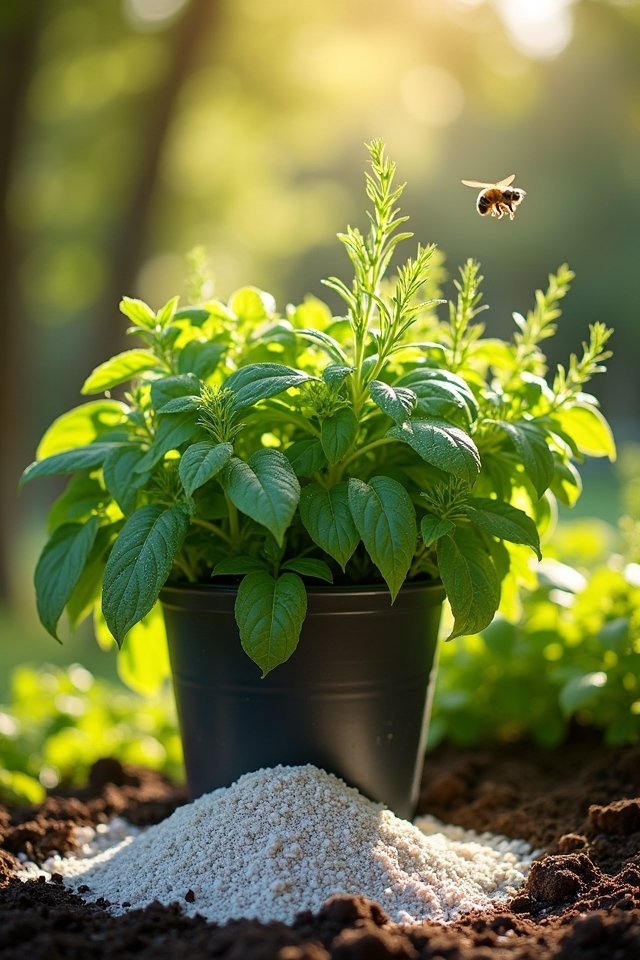
If you’ve ever wished for a secret weapon against pests that’s as friendly to your herbs as a warm hug, then search no more than diatomaceous earth! This powdery miracle, made from ancient sea creatures, offers dazzling diatomaceous earth benefits. It’s a natural insecticide that works by dehydrating pesky critters. Just sprinkle it around your container plants, and watch those bugs shrink away like ice on a sunny day!
For effective application, simply use a dusting or mix it with water for a spray—tap into your inner scientist! It’s eco-friendly and safe for your herbs, creating a pest-free oasis. Why settle for bland solutions when you can release this innovative ally in your garden? Immerse yourself in diatomaceous earth, and let your herbs thrive!
Companion Planting for Pest Deterrence
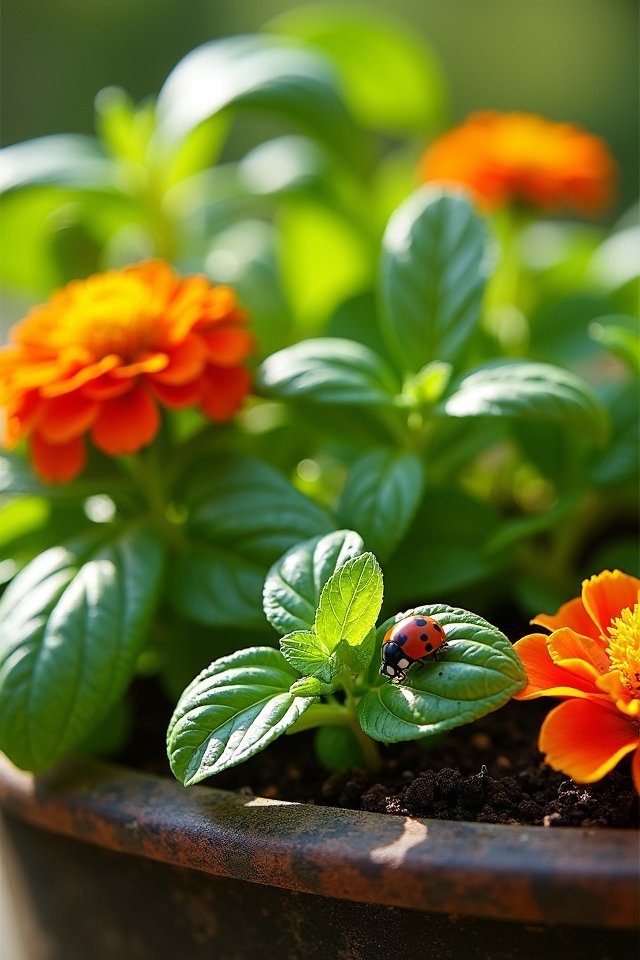
Companion planting isn’t just about sharing the garden space; it’s like hosting a fabulous party where each plant brings its own talent to deter pests! By strategically pairing herbs, you enhance herb compatibility and create a natural pest-repelling dynamic. For example, plant basil alongside your tomatoes—this classic duo not only boosts flavor but also keeps pesky aphids at bay. Or try marigolds with your herbs; their vibrant blooms attract beneficial insects while keeping harmful pests away! It’s all about pest awareness—knowing which plants can protect each other. So, shake things up in your garden! Get creative, and watch your herb containers thrive like a well-orchestrated symphony, full of diverse plants harmonizing together for a healthy, pest-free space!
Essential Oils for Insect Repellent
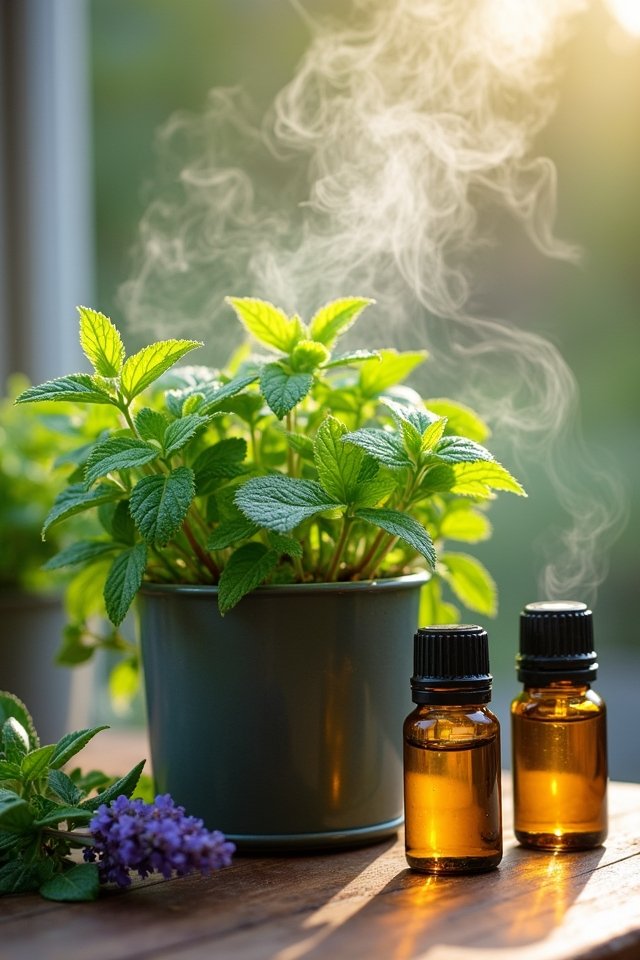
When it comes to keeping pesky insects at bay, essential oils are like nature’s superhero sidekicks, swooping in to save your herb containers! You can create your own insect repellent recipes using fabulous essential oil blends. Try combining lavender, peppermint, and eucalyptus oils; the scent is invigorating and, more importantly, bugs hate it! Just mix a few drops with water in a spray bottle, and you’re ready to tackle those unwelcome guests. Feeling fancy? Add a bit of witch hazel for an extra punch! Not only will your herbs thrive, but your garden will smell divine too. So, why settle for store-bought solutions when you can harness the power of nature? Give it a shot, and let those bugs buzz off!
Frequently Asked Questions
Are Organic Pest Solutions Safe for Pets and Children?
Absolutely, organic pest solutions can be safe for both pets and kids! Just think of it like munching on veggies instead of junk food—it’s all about making healthier choices. You’ll want to check the labels for pet safety and child safety info, though. For instance, neem oil’s gentle scent can ward off pests while keeping your home cozy. Isn’t it amazing how nature’s remedies can protect your loved ones and your plants?
How Often Should I Apply Homemade Sprays?
Did you know that pests can reproduce every few days? That’s why spray frequency is key! You should apply your homemade sprays every 5 to 7 days, especially during peak pest activity. This keeps their life cycle in check and makes them think twice about munching on your plants! Think of it as a dance-off with pests; if you don’t keep the rhythm, they might steal the spotlight! Keep spraying, and enjoy your thriving garden!
Can I Use Diatomaceous Earth Indoors?
Absolutely, you can use diatomaceous earth indoors! Think of it as nature’s secret weapon for indoor pest control! This fine powder disrupts pests like a bumpy road for tiny bugs. Just sprinkle it in corners or around furniture, and watch those pesky critters avoid it like it’s an icy sidewalk! Make sure to choose food-grade diatomaceous earth for safety. It’s an innovative solution that lets you tackle pests while keeping your home fresh and healthy!
What Herbs Repel Specific Pests Effectively?
You’ll love how certain herbs can zap pests away! For instance, basil’s like a superhero against pesky flies, while mint takes on ants like a boss. Rosemary won’t let those beetles crash your party either! Lavender’s calming scent? It sends mosquitoes packing! Harnessing these herb benefits not only keeps your garden thriving, but it also gives you a fun, natural way to combat those annoying pest types. Don’t you just adore nature’s little tricks?
How Do I Store Homemade Organic Pest Solutions?
Did you know that homemade organic pest solutions can stay potent for up to two weeks? You’ll want to grab some airtight storage containers! Keep your solutions away from light and heat, extending their shelf life. Label each container with the date and ingredients, so you can keep track. Think of them as little potions in a wizard’s cabinet! Store wisely, and who knows? You might just brew a magical bug-repelling remedy!
